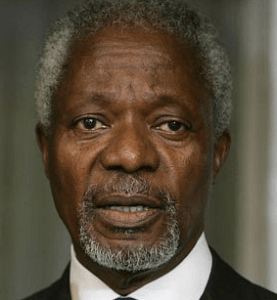Kofi Annan urges universities to tackle challenges of global peace

Institutions of higher education, have been entreated to address the deficits of democratic governance and the erosion of social cohesion by tackling the challenge of global peace and security.
Mr Kofi Annan, the Chancellor of the University of Ghana, said universities could play powerful roles in attacking contemporary challenges of global peace and security, which have been heightened by growing economic and social inequalities.
In a keynote address at the opening of a three-day Association of Commonwealth Universities Conference of University Leaders in Accra, Mr Annan said while universities, especially in Africa, are improving and playing an ever increasing role in addressing the challenges, they must go beyond transferring skills and qualifications.
He said while demand on universities are great and resources limited, necessitating the establishment of priorities and making difficult choices, it is important for them to develop strong and meaningful bonds with the societies in which they operate.
Mr Annan said there is a deficit of democratic governance, which clouds the future of young people, especially in the global north and south.
He said though the young people are more educated and informed than previously, the future of those in Africa and beyond are compromised by poor governance.
The questionable conduct of elections and poor governance that often follow creates the democratic deficit, he noted.
He said governments stand the risk of riots, rebellions and even revolutions, if the frustrations of the youth are not seen and addressed.
The former United Nations Secretary General said education impacts governance and democracy, not only by increasing voter turnout, but also increasing participation in political activities such as running for office, taking part in campaigns and joining political parties in a more informed manner so that “responsibilities of citizenship override ethnic or sectarian affiliation”.
He urged higher education institutions to help foster a better understanding of democracy, its benefits and also practice democracy by expanding access to higher education for all segments of the society.
Mr Annan expressed the need for higher education institutions to address the erosion of social cohesion caused by inequality and intolerance.
He stated that sustainable democratic societies must be built on three pillars of progress: “peace and security, sustainable development and human rights and rule of law.
“Institutions of higher education are vital structures supporting these pillars of progress,” he said.
Professor Jane Naana Opoku Agyeman, the Minister of Education, expressed the need for deeper dialogue between educators and industry to close the existing gap.
She said there is an established disconnect between graduates and the needs of employers, thus the need for dialogue.
“We need to close the gap, we need to make it as seamless as we can. Most importantly, we need to interrogate the earlier platitudes on which our universities were established,” she stated.
The three-day conference on the theme: “Defining the responsible University: society, impact and growth,” would see more than 250 delegates from more than 20 countries, representing universities and institutions of higher learning in the Commonwealth.
It would seek to access what responsibility universities have to the society and economic objectives they could achieve.
Source: GNA
